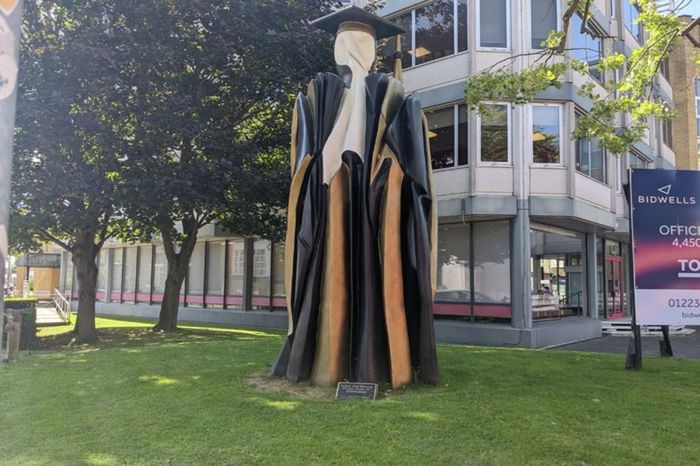‘Poorest quality’ Cambridge statue to be removed after lengthy legal disputes
The sculpture has been labelled ‘detritus masquerading as public art’

The controversial ‘Cambridge Don’ statue is set to be removed after planning permission for it was rejected following an appeal.
The statue, located on the corner of Hills Road and Norwich Street, will now be removed in compliance with the council’s original enforcement notice.
This comes after lengthy legal disputes beginning in June where the Unex Group, who paid roughly £150,000 for the statue, claimed they did not need planning permission for the sculpture as it is not fixed to the ground.
Unex’s legal representative added that the statue was “simply dropped in place and is able to be lifted up,” and therefore “cannot as a matter of law be considered development”.
The bronze sculpture, intended to depict the late Prince Phillip in his time as Chancellor of Cambridge University, weighs approximately three tonnes and was installed with no discussion with residents.
Despite Bill Gredley, Chair of the Unex Group, dubbing the sculpture as a “spectacular piece of art,” the statue has divided opinions with its design.
One art critic previously labelled the piece as “detritus masquerading as public art,” with a council planner describing it to be “possibly the poorest quality work”.
The sculpture has also been disowned by its alleged artist, Pablo Atchugarry, who claimed that crediting him for the statue was “an abuse”.
Liberal Democrat Councillors Katie Porrer, Anthony Martinelli, and Tim Bick who represent the area in which the statue has been positioned, have been fighting alongside residents for months for its removal.
Porrer, who attended both days of the public appeal for the statue’s removal in August, said: “When this statue appeared in such a prominent location with no notice, no consultation and no planning permission, ward councillors worked with residents and the council to enforce against this.”
“Applying for planning permission is part of the democratic process that allows residents to be consulted on these kind of developments,” Martinelli added.
 News / Under 3% of applicants for Cambridge academic jobs are successful7 April 2025
News / Under 3% of applicants for Cambridge academic jobs are successful7 April 2025 News / News in Brief: cats, Camelot, and construction woes6 April 2025
News / News in Brief: cats, Camelot, and construction woes6 April 2025 Comment / Cambridge’s gossip culture is a double-edged sword7 April 2025
Comment / Cambridge’s gossip culture is a double-edged sword7 April 2025 Sport / Previewing the 170th Boat Race7 April 2025
Sport / Previewing the 170th Boat Race7 April 2025 Lifestyle / Which college brunch should be next on your list?6 April 2025
Lifestyle / Which college brunch should be next on your list?6 April 2025






